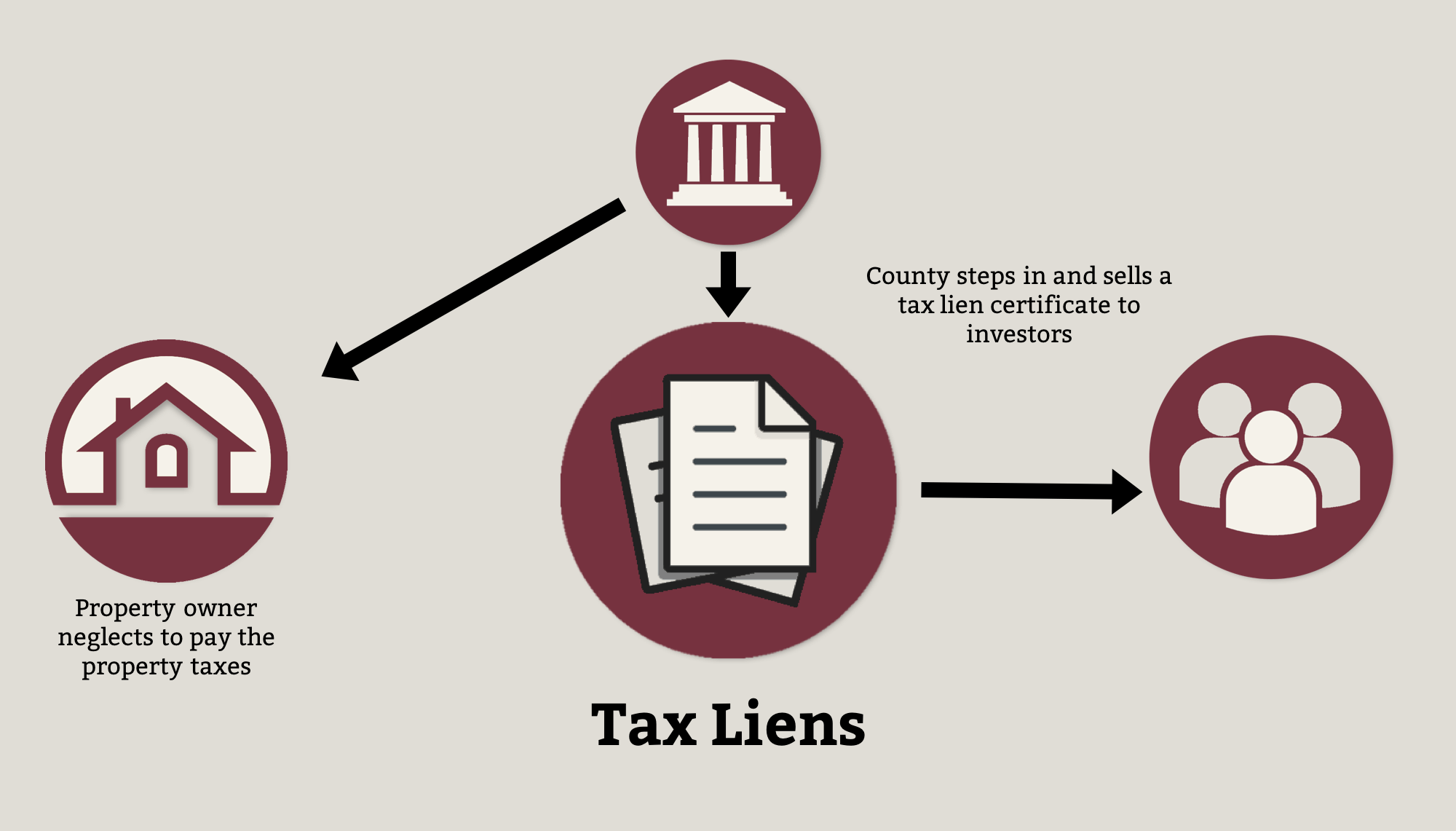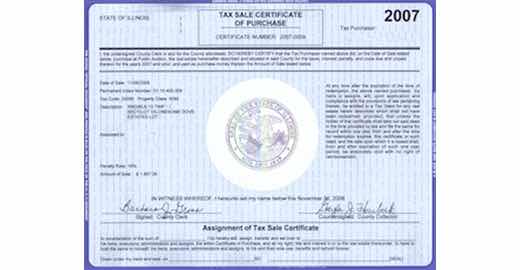All Categories
Featured
Table of Contents
Tax lien investing can offer your profile direct exposure to realty all without needing to in fact possess home. Specialists, however, state the procedure is complicated and caution that amateur investors can easily get shed. Right here's every little thing you require to learn about investing in a tax lien certification, consisting of how it works and the threats entailed.
The notice commonly comes prior to harsher activities, such as a tax levy, where the Irs (INTERNAL REVENUE SERVICE) or neighborhood or local governments can really confiscate a person's building to recuperate the financial obligation. A tax lien certificate is developed when a home proprietor has fallen short to pay their tax obligations and the city government concerns a tax lien.
Tax obligation lien certifications are usually auctioned off to investors seeking to earnings. To recoup the overdue tax obligation dollars, communities can after that offer the tax lien certificate to private capitalists, who care for the tax costs in exchange for the right to accumulate that cash, plus interest, from the home owners when they eventually repay their equilibrium.
How To Invest In Tax Liens Online
allow for the transfer or task of overdue property tax liens to the economic sector, according to the National Tax Obligation Lien Organization, a nonprofit that represents governments, institutional tax obligation lien investors and servicers. Here's what the procedure resembles. Tax obligation lien capitalists have to bid for the certificate in an auction, and exactly how that process works depends upon the certain town.
Get in touch with tax obligation officials in your location to ask how those overdue tax obligations are gathered. The town establishes an optimum price, and the bidder supplying the lowest rate of interest rate under that maximum wins the auction.
Various other winning quotes go to those who pay the highest cash money amount, or premium, above the lien quantity. What takes place next for financiers isn't something that happens on a supply exchange. The winning bidder has to pay the whole tax expense, including the overdue debt, rate of interest and penalties. After that, the financier has to wait until the homeowner repay their whole equilibrium unless they don't.
While some investors can be rewarded, others may be caught in the crossfire of challenging policies and loopholes, which in the worst of circumstances can bring about significant losses. From a simple profit standpoint, most capitalists make their money based on the tax lien's rate of interest. Rates of interest vary and depend on the territory or the state.
Profits, however, don't always total up to yields that high throughout the bidding process. Ultimately, the majority of tax liens bought at public auction are cost rates between 3 percent and 7 percent country wide, according to Brad Westover, executive supervisor of the National Tax Obligation Lien Organization. Prior to retiring, Richard Rampell, formerly the president of Rampell & Rampell, a bookkeeping company in Palm Beach, Florida, experienced this firsthand.
Investing In Tax Liens And Deeds
In the beginning, the partners succeeded. Then large institutional capitalists, including banks, hedge funds and pension funds, chased after those greater yields in auctions around the nation. The larger financiers assisted bid down rate of interest, so Rampell's team wasn't making considerable money anymore on liens. "At the end, we weren't doing far better than a CD," he states - best tax lien investing course.
However that hardly ever occurs: The tax obligations are typically paid before the redemption date. Liens also are first eligible settlement, even before home loans. Even so, tax obligation liens have an expiry day, and a lienholder's right to seize on the property or to gather their investment ends at the very same time as the lien.
"In some cases it's 6 months after the redemption period," Musa says. "Don't assume you can just acquire and forget it." Individual financiers who are taking into consideration financial investments in tax obligation liens should, most of all, do their research. Professionals suggest preventing properties with environmental damages, such as one where a gas station unloaded unsafe material.
How Do You Invest In Tax Liens
"You ought to really comprehend what you're acquiring," says Richard Zimmerman, a partner at Berdon LLP, an audit company in New york city City. "Know what the building is, the area and worths, so you do not buy a lien that you won't be able to gather." Would-be capitalists must additionally inspect out the residential or commercial property and all liens against it, as well as recent tax sales and list price of comparable buildings.
Yet, bear in mind that the info you find can usually be outdated. "Individuals obtain a list of residential or commercial properties and do their due diligence weeks prior to a sale," Musa claims. "Half the residential properties on the checklist may be gone since the taxes make money. You're squandering your time. The closer to the day you do your due diligence, the much better.
How Do You Invest In Tax Liens

Westover states 80 percent of tax lien certificates are sold to members of the NTLA, and the agency can often pair up NTLA members with the ideal institutional capitalists. That could make managing the process simpler, particularly for a newbie. While tax obligation lien investments can use a charitable return, understand the small print, details and regulations.
"However it's complicated. You need to comprehend the details." Bankrate's added to an upgrade of this tale.
Real estate tax liens are an investment niche that is forgotten by most financiers. Purchasing tax obligation liens can be a financially rewarding though relatively danger for those that are well-informed about property. When individuals or companies stop working to pay their residential property taxes, the municipalities or other government bodies that are owed those taxes place liens against the buildings.
Invest In Tax Liens Online
These insurance claims on collateral are likewise exchanged among capitalists that wish to produce above-average returns. Through this procedure, the town obtains its tax obligations and the financier gets the right to gather the quantity due plus rate of interest from the debtor. The procedure hardly ever finishes with the capitalist taking ownership of the building.
If you need to seize, there may be various other liens against the building that maintain you from taking belongings. You can likewise spend indirectly by means of property lien funds.
It successfully ties up the property and prevents its sale until the owner pays the taxes owed or the residential property is seized by the financial institution. For example, when a landowner or house owner falls short to pay the taxes on their property, the city or area in which the home is situated has the authority to put a lien on the home.
Home with a lien attached to it can not be marketed or re-financed until the tax obligations are paid and the lien is gotten rid of. When a lien is issued, a tax obligation lien certification is created by the community that mirrors the quantity owed on the residential property plus any kind of interest or penalties due.

It's estimated that an additional $328 billion of residential or commercial property tax obligations was assessed across the U.S. in 2021. It's challenging to examine across the country property tax obligation lien numbers.
Table of Contents
Latest Posts
Sales In Excess
Tax Default Homes
Tax Foreclosure
More
Latest Posts
Sales In Excess
Tax Default Homes
Tax Foreclosure